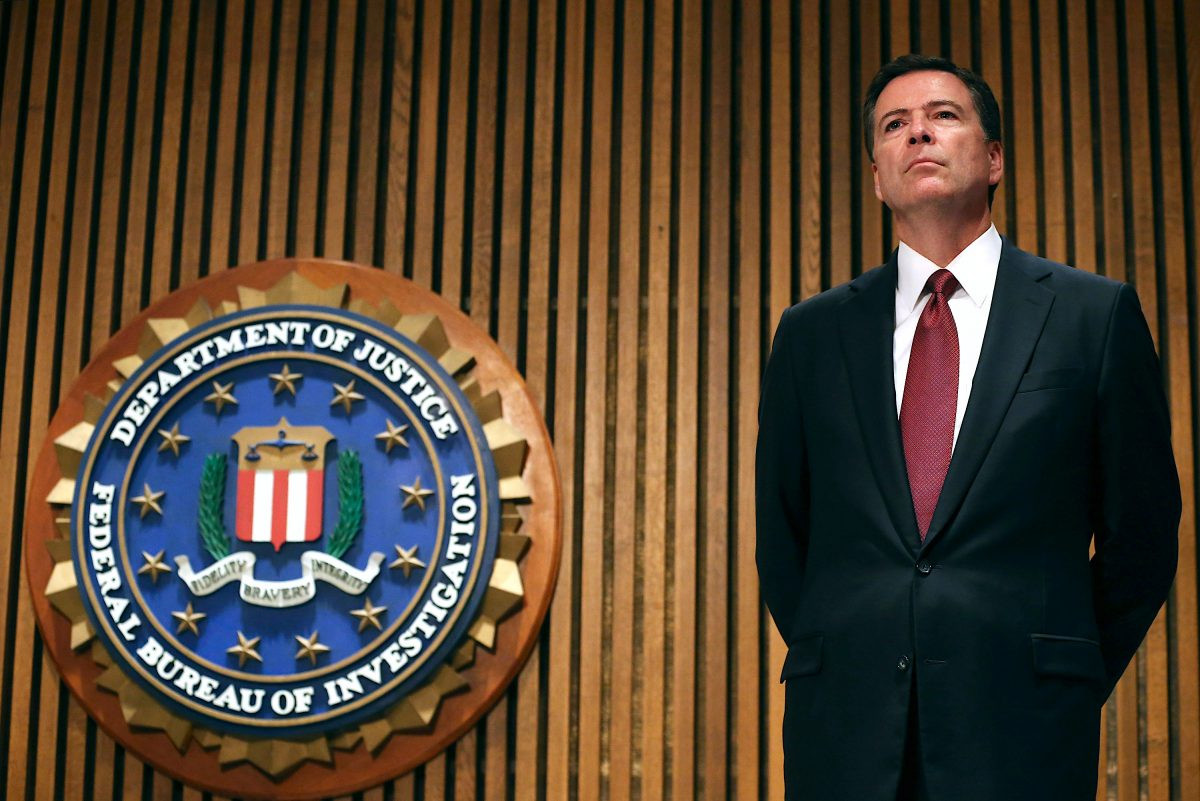

FBI officials intervened again and again ahead of the 2016 election to limit agents’ ability to investigate potential criminal activity related to former Secretary of State Hillary Clinton or her presidential campaign, according to a recent report by special counsel John Durham.
The report contrasts the bureau’s treatment of Clinton-related matters with those related to her opponent, Republican presidential candidate Donald Trump.
The Clinton-related cases emerged from local field offices only to run into delays and pushback when seeking approval and cooperation from the headquarters in Washington. Top FBI officials responded to the probes with hostility and tried to pick apart their predication, the report details.
By contrast, the investigation of Trump’s campaign members was quickly and unanimously approved at the highest levels and pushed forward by the officials despite them being predicated on vague, unverified claims, according to the report.
In late 2014, the FBI learned from an informant that a foreign government was planning “to contribute to Clinton’s anticipated presidential campaign, as a way to gain influence with Clinton should she win the presidency,” the report said.
Not only was the informant “well-placed,” but the FBI was able to independently corroborate the information, it said.
The field office handling the informant “almost immediately” sought a Foreign Intelligence Surveillance Act (FISA) warrant to monitor the foreigner. It tried to get the warrant quickly approved, but headquarters left the application “in limbo” for four months, the special agent in charge (SAC) at the field office said, according to the report, which noted that the delay was also in part due to waiting for confirmation of a new attorney general.
“Everyone was ‘super more careful’” and “scared with the big name [Clinton],” another agent said.
“They were pretty ‘tippy-toeing’ around [Clinton] because there was a chance she would be the next president.”
The higher-ups suggested to the SAC that “they did not want a presidential candidate on a tape,” the report said, noting that, in the SAC’s view, “that was a very remote possibility.”
Ultimately, the FISA was conditioned on the FBI’s giving “defensive briefings” to the Clinton campaign and other candidates targeted by the same foreign government. The briefings serve to warn an American that he’s being targeted by a foreign government operation.
In November 2015, the same informant told the FBI that he was approached by an insider of another foreign government who asked him to set up a meeting with Clinton in order to propose “something.” The informant understood it meant “campaign contributions on behalf of” the foreign government “in exchange for protection of [the government’s] interests should Clinton become president,” the report said.
The FBI knew that the insider had “foreign intelligence and criminal connections” and the proposed campaign contributions allegedly involved “a significant sum of money,” according to Durham.
The insider wanted to attend a November 2015 Clinton fundraiser, but ultimately didn’t and asked the informant to instead deliver a “message of support” for Clinton at another fundraiser in January 2016. The informant was authorized by the FBI to deliver the message, but after the fact the informant reported that he also made a $2,700 contribution to the campaign on behalf of the insider. Giving to a campaign on behalf of a foreigner is illegal, Durham noted.
“They [the campaign] were ok with it,” the informant reported. “Yes, they were fully aware from the start.”
The illegal campaign donation wasn’t documented in the case file and nobody, from the handling agent to the higher-ups at headquarters, could provide Durham with any explanation why—if they admitted remembering anything about the donation at all.
But Durham uncovered some internal messages that showed some higher-ranking agents at the headquarters were aware of the donation and were at the time urgently seeking more information about it.
In the end, however, the investigation appeared to have been snuffed out, the report indicates.
The handling agent, “responding to direction,” the report said, told the informant:
“Do NOT attend any more campaign events, set up meetings, or anything else relating to [Clinton’s] campaign. We need to keep you completely away from that situation. I don’t know all the details, but it’s for your own protection.”
“The FBI effectively removed their sole source of insight into this threat,” the report said.
Starting in January 2016, the FBI field offices in Washington, New York, and Little Rock, Arkansas, launched investigations of possible criminal activity related to the Clinton Foundation.
The Little Rock office based the probe on an “intelligence product and corroborating financial reporting,” the report said, indicating that an “industry likely engaged a federal public official in a flow of benefits scheme, namely, large monetary contributions were made to a non-profit, under both direct and indirect control of the federal public official, in exchange for favorable government action and/or influence.”
The Little Rock and New York offices also had an allegation from an informant that foreign governments “had made, or offered to make, contributions to the Foundation in exchange for favorable or preferential treatment from Clinton,” the report said.
The Washington one was based on allegations made by author Peter Schweizer in his book “Clinton Cash.”
The New York and Washington probes were only “preliminary,” Durham wrote, because their basis hadn’t been verified.
On Feb. 1, 2016, the offices held a meeting with each other, headquarters officials, as well as Department of Justice (DOJ) and local prosecutors.
One of the DOJ officials involved, Ray Hulser, derided the investigations as “poorly presented” and otherwise “downplayed” some of the information when he later talked to Durham’s team. He claimed the information from financial records involved “de minimis” sums of money, according to the report. In fact, the sums involved went into the hundreds of thousands, Durham noted.
Another official recalled the DOJ’s reaction to the investigations was “hostile,” the report said.
Three weeks later, another meeting took place at the FBI headquarters, this time led by then-Deputy Director Andrew McCabe.
McCabe initially told the offices to shut the cased down, but relented upon some pushback.
One official from the Washington Field Office, Paul Abbate, later described McCabe as “negative,” “annoyed,” and “angry” during the meeting.
“[The DOJ] say there’s nothing here,” McCabe said, according to Abbate. “Why are we even doing this?”
In the end, the offices were ordered to seek approval directly from McCabe before taking any overt investigative steps.
The restriction “essentially remained in place until August 2016,” the report said.
Local agents left the meeting frustrated with the restrictions, Abbate said.
Diego Rodriguez, then-head of the New York Field Office, recalled that one of the top FBI officials called him in May 2016 on behalf of then-Director James Comey and told him to “cease and desist” from the Clinton Foundation probe due to an undisclosed counterintelligence reason. Durham, however, couldn’t find any such reason.
There was another meeting in August, this time a videoconference. The Little Rock and Washington offices were told to shut down the probes and turn them over to the New York office, which was also authorized to seek subpoenas in the case from the New York federal prosecutors in their area.
But when the office tried to get the subpoenas, the prosecutors refused to do it, the report said.
Durham repeatedly pointed out the contrast between the probes involving Clinton and the one involving Trump.
The FBI opened an investigation into Trump campaign staff on July 2016 based on a single uncorroborated claim that a campaign aide, George Papadopoulos, “suggested” during a casual talk with an Australian diplomat the campaign received “some kind of suggestion” that Russia may help it by releasing info damaging to Clinton. Durham later learned that Papadopoulos may have never made any such suggestion to begin with.
Despite the flimsy basis, FBI leadership, including Comey and McCabe, were unanimous in launching the probe as a “full” investigation right off the bat, a fact that Durham criticized.
Moreover, most of the officials involved didn’t recall even discussing whether to give the Trump campaign a defensive briefing, the explanation being that they didn’t want to tip off the campaign because the FBI didn’t know whether Trump’s team was in fact colluding with Russia.
Durham pointed out that in one of the cases involving Clinton, the FBI also didn’t know whether her campaign was colluding with the foreign government involved, but still gave Clinton, through her lawyer, a defensive briefing.
Furthermore, the FBI didn’t hesitate to seek a FISA warrant on another Trump campaign aide, Carter Page, using unverified claims from the infamous Steele Dossier, which they knew was being pushed into the FBI by the Clinton camp.
FBI officials put the dossier claims into a FISA application just two days after obtaining them, before even attempting to verify them. The warrant was pushed through in a month.
The dossier was a mishmash of public information and fabrications, the report indicated. The FBI later acknowledged that at least the later renewals of the FISA warrant were invalid and resulted in illegal surveillance.
![[GOOD PRESS] ON[GOOD PRESS] ON](https://georgemagazine.com/wp-content/uploads/2024/08/16389056566437433941_2048-300x300.jpeg)



Discount Applied Successfully!
Your savings have been added to the cart.